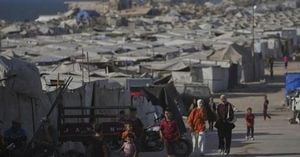The Brazilian Air Force (FAB) made headlines this week after decisively shooting down a small plane suspected of narcotics trafficking, bringing attention to the complex issues of drug smuggling along Brazil's borders. This incident, which occurred on February 11, 2025, involved the aircraft entering Brazilian airspace illegally from Venezuela and refusing to comply with official landing directives.
According to the FAB, the unidentified plane was first detected as it crossed the border and immediately raised suspicions due to its lack of identification. With heliport and aerodrome directives issued, both the FAB and the Brazilian Federal Police (PF) took the necessary measures to intercept the aircraft.
Despite multiple warnings issued, the pilots of the craft—two men—continued their flight path, prompting the FAB to classify the aircraft as hostile. The decision to take extreme measures, as supported by the legal framework known as the "Law of Abate," aligned with the regulations stipulated under the Brazilian legal code.
“Não atendendo aos procedimentos coercitivos descritos no Decreto nº 5.144, a aeronave foi classificada como hostil e, dessa forma, submetida ao Tiro de Detenção (TDE), que consiste no disparo de tiros, com a finalidade de impedir a continuidade do voo. Essa medida é utilizada como último recurso, após a aeronave interceptada descumprir todos os procedimentos estabelecidos e forçar a continuidade do voo ilícito,” stated the FAB, explaining the gravity of the situation.
Following repeated defiance by the pilots, the FAB faculty decided to utilize Tiro de Detenção as prescribed protocols dictated it was the last resort under the circumstances. The aircraft was shot down, crashing shortly thereafter in the forested region nearby Manaus, Amazonas.
Authorities later discovered the bodies of the pilots along with apparent evidence of drug trafficking on the aircraft; the estimated quantity is still undergoing analysis by officials. During this operation, law enforcement made clear the importance of ensuring airspace integrity and safety, particularly when it is repeatedly threatened by smuggling efforts.
This isn't the first time Brazil has had to confront aerial narcotics trafficking. The FAB has been involved in similar operations over the past year, indicating the growing challenges posed by international drug trade networks attempting to exploit under-regulated air routes.
It is notable to mention the enforcement actions by the FAB prior to this event, such as the interception of another aircraft transporting more than 240 kilograms of drugs from Venezuela to Brazil just last year, showcasing the continuing struggle against drug-related crimes across the Amazon.
While the immediate effects of this intervention are clear, it raises broader questions about the effectiveness of Brazilian air defense capabilities against threats potentially sourced from beyond its borders. The ability to track and intercept suspected smuggling flights often requires collaboration, not only with the PF but also with international partners who can provide intelligence and support.
Certainly, incidents like these expose the vulnerabilities present at national frontiers and serve as stark reminders of the lengths authorities must go to protect their territory from external threats. The uprising of drone transportation and sophisticated smuggling strategies means the FAB and its allied services must remain vigilant as they navigate these multifaceted challenges.
The shooting down of this airplane invokes debates about national security measures, airspace sovereignty, and the ethics of using lethal force against suspected traffickers. The necessity of balancing these factors remains delicate, but the Brazilian government has reiterated its commitment to combating encroachments on its airspace.
With the backdrop of the growing drug problem, resilience from both law enforcement and military branches remains pivotal. There is little doubt these operations highlight impactful steps toward more secured borders and fewer illicit drug pathways infiltrated within Brazilian territory.



